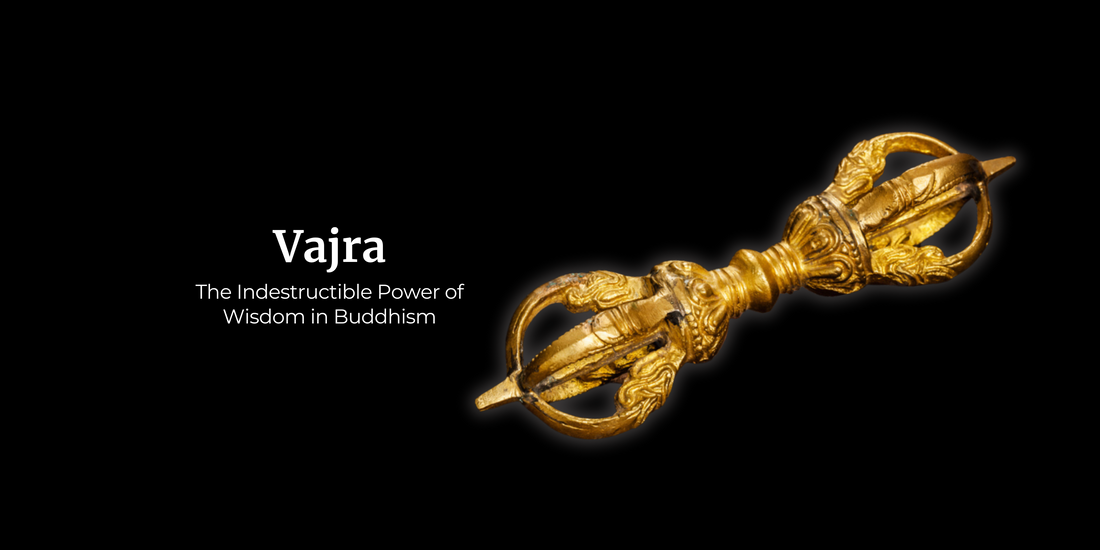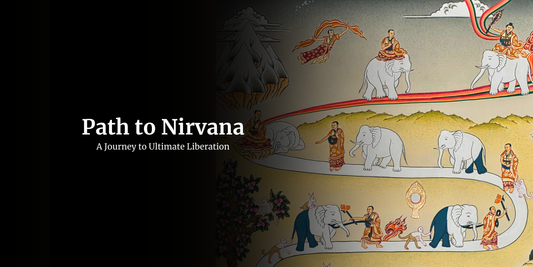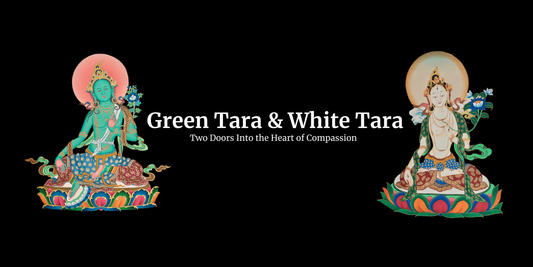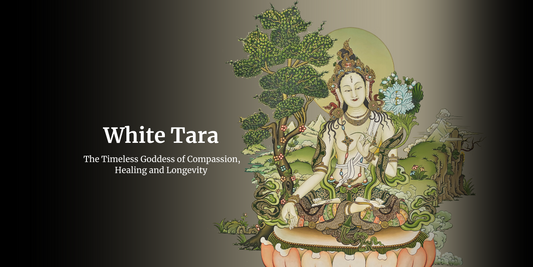- Buddhas Art of Healing
- Thangka
- Vajra: The Indestructible Power of Wisdom in Buddhism

Vajra: The Indestructible Power of Wisdom in Buddhism
You might have heard about Vajra, right? It is one of the most powerful and attractive symbols in Buddhism.
Vajra is unwavering as a diamond and invincible as Thunderbolt. It is a symbol of clarity that brightens and carries out the unbeatable energy of enlightenment.
Curious to know how this ancient symbol can inspire your own journey? Let's dive!
Vajra in Buddhism: Meaning and Origins
In Sanskrit, "Vajra" means "Diamond" and "Thunderbolt." Vajra is also called "Dorje" in Tibetan and has a very deep meaning. It is one of the most prestigious symbols in Buddhism. Symbolizes clarity, strength, and the truth of enlightened knowledge, and also the connection between compassion and knowledge.
Vajra first appeared in ancient Indian mythology as a powerful weapon of Lord Indra. But in Buddhism, it turned into something more meaningful. Not a weapon to fight outside, but spiritual equipment to overcome our internal enemies: ignorance, attachment, and hatred.
You will see Vajra in many forms: Buddhist Vajra and Bell, Vajra Mudra, or Vajra Sutra teachings. No matter how it appears, the message is the same: be unbreakable, become kind, and let your internal truth shine like a diamond.
Want to see the Vajra brought to life in sacred art? Explore our Vajrasattva Thangka collection. Each piece carefully depicts this powerful symbol.
Sutra: Wisdom That Cuts Through Illusion
In Mahayana Buddhism, the Vajra Sutra (Diamond Sutra) is one of the major texts. It uses the imagery of the thunderbolt to describe the nature of the final truth: fast, clear, and able to break through all illusions.
Some major teachings:
- Emptiness of inherent existence: All phenomena lack fixed identity
- Compassion in action: Knowledge should be associated with the desire to benefit all beings.
- To allow detachment: Even to spiritual concepts
This sutra inspires practitioners that reality is as clear and unshakable as a diamond.
The Vajra Mudra: The Gesture of Unshakable Power
The Vajra mudra is a hand gesture seen in many Buddhist statues and paintings. It is made by clasping one fist and extending the index finger, symbolizing a lightning bolt of wisdom that pierces ignorance. In meditation, this mudra is believed to:
- Strengthen concentration
- Invoke clarity of mind
- Connect the practitioner with the indestructible truth
The Vajra Weapon: From Myth to Spiritual Power
In Vedic tradition, the vajra weapon was the thunderbolt wielded by Indra, the king of gods, to defeat enemies. Buddhism transformed this image into the Buddhist vajra, a tool for defeating the ultimate enemies: ignorance, hatred, and greed.
Meet Vajrapani, the fierce protector who wields the vajra, in our Vajrapani Thangka collection.
Vajra and Bell: The Union of Wisdom and Compassion
In Vajrayana Buddhist rituals, the Vajra (dorje) is always paired with a bell (drilbu).
|
Ritual Object |
Symbolism |
Hand Used |
Meaning in practice |
|
Vajra (Dorje) |
Method/compassion |
Right hand |
Represents skillful means and the active force of compassion |
|
Bell (Drilbu) |
Wisdom |
Left hand |
Represents the insight into emptiness and ultimate truth |
When used together, they symbolize the inseparability of wisdom and compassion, which must be cultivated together for full awakening.
Bring home the symbolism of the Vajra and bell through a hand-painted Vajrasattva Thangka.
Sacred Geometry of Enlightenment
The vajra symbol is made up of two symmetrical ends connected by a central sphere.
Key elements include:
- Lotus petals: purity of mind
- Prongs: the five wisdoms of a Buddha
- Central sphere: the union of relative and ultimate truth
This structure mirrors the Buddhist path itself—grounded in purity, balanced between wisdom and compassion, and culminating in enlightenment.

|
Parts |
Description |
Symbolism |
|
Central Axis (Stem) |
The straight rod running through the entire vajra from end to end |
Represents the path of unchanging truth, connecting wisdom and method: the “spinal column” of enlightenment |
|
Makara Heads |
Mythical sea-creature heads located at the base of the prongs, Often stylized with curling snouts and ornate detail |
Symbolize the fierce compassion that protects the Dharma and swallows obstacles. In some traditions, makaras link water and wisdom: adaptability and depth. |
|
Eight-Petalled Lotus |
Located between the makara heads and the central hub. Each lotus is formed of four smaller and four larger petals. |
Symbolizes purity and the unfolding of the awakened mind; the eight petals often represent the Eightfold Path. |
|
Three Rings (Collars) |
Three decorative bands or “rings,” between the lotus base and central sphere |
Represents the Three Jewels: Buddha, Dharma, Sangha, or the three trainings of morality, meditation, and wisdom |
|
Central Round Hub (Sphere) |
The perfect sphere at the center |
The indivisible union of wisdom and compassion; the heart of non-dual awareness where all opposites dissolve |
Many people see the Vajra only as a beautiful ritual object, but once you understand its anatomy, it becomes a condensed teaching in itself.
The central axis reminds you to stay aligned with truth; the makara heads show that fierce compassion can overcome obstacles; the eight-petalled lotus points to purity; the three rings anchor practice, and the central hub reveals the ultimate goal, as the whole is the union of wisdom and compassion.

1. What is Vajra in Buddhism
It is a ritual object symbolizing the indestructible truth of enlightenment, representing compassion and wisdom in unity.
2. What is the Vajra Sutra?
A Mahayana Buddhist scripture using the vajra as a metaphor for wisdom that cuts through illusions.
3. What is the purpose of the Vajra and bell?
They are used simultaneously in rituals to represent the inseparable association of wisdom and compassion.
4. Is the Vajra a weapon?
In mythology, yes—it was Indra’s thunderbolt. In Buddhism, it is a spiritual weapon against ignorance.
5. What is a Vajra mudra?
The gesture of one hand that invites clarity, meditation, and the power of knowledge.
Conclusion
In a world full of distraction and confusion, the Vajra reminds us of an unshakable truth—that wisdom and compassion together can overcome any obstacle.
It’s more than an ancient symbol; it’s a living teaching that continues to guide practitioners toward clarity, kindness, and freedom.
Explore our curated thangka collection and discover the artwork that brings sacred beauty into your space. Discover Buddha's Art of Healing.



